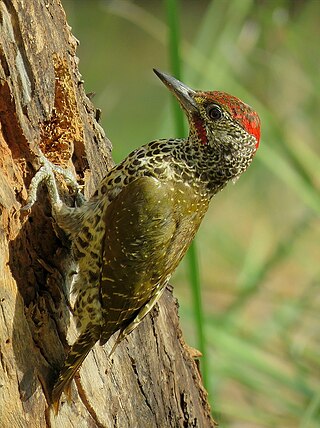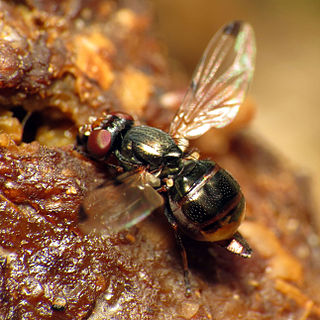
Zygiella x-notata, sometimes known as the missing sector orb weaver or the silver-sided sector spider, is a spider species in the family Araneidae. They are solitary spiders, residing in daily spun orb webs. Z. x-notata is a member of the genus Zygiella, the orb-weaving spiders. The adult female is easily recognized by the characteristic leaf-like mark on her posterior opisthosoma, caudal to the yellow-brown cephalothorax.

Zygiella is a genus of orb-weaver spiders first described by F. O. Pickard-Cambridge in 1902. In 2015, Parazygiella was determined to be a taxonomic synonym of Zygiella, and its species were moved to Zygiella.
Oreophryne notata is a species of frog in the family Microhylidae. It is endemic to Papua New Guinea and known from two localities, Ialibu, its type locality in the Southern Highlands Province, and Tabubil in the Western Province. It might occur more widely. The specific name notata is from Latin nota meaning a "mark" or "letter" and refers to the diagnostic U-like pattern on the lores.

The yellow-spotted honeyeater is a species of bird in the family Meliphagidae. It is also known as the lesser lewin. The bird is endemic to northern Queensland. The bird's common name refers to the yellow patch that members of the species have behind their eyes.

The Knysna woodpecker is a species of bird in the family Picidae. It is endemic to South Africa, where its natural habitats are subtropical or tropical moist lowland forests, moist savanna, and subtropical or tropical moist shrubland. It is threatened by habitat loss. It belongs to a species complex that includes the golden-tailed and Mombasa woodpeckers.
Microsynodontis notata is a species of upside-down catfish endemic to Gabon where it occurs in the Ogowe River. It was first described in 2004 by Ng Heok Hee.

Euxesta notata is a species of ulidiid or picture-winged fly in the genus Euxesta of the family Ulidiidae. It is found in Canada. As a larva it is referred to as the spotted root maggot, and has evolved genetic resistance against DDT.
Clypidina is a genus of sea snails, marine gastropod mollusks in the family Fissurellidae, the keyhole limpets.

Mnesictena notata is a moth in the family Crambidae. It was described by Arthur Gardiner Butler in 1879. It is endemic to New Zealand.

Thevenetimyia is a genus of bee flies in the family Bombyliidae. There are more than 40 described species in Thevenetimyia found worldwide, mostly in North America with several species in Australia and southeast Asia.

Laphystia litoralis is a species of robber flies in the family Asilidae.

Oedancala is a genus of true bugs in the family Pachygronthidae. There are about 14 described species in Oedancala.
Laphystia ochreifrons is a species of robber flies in the family Asilidae.
Melanophila notata is a species of metallic wood-boring beetle in the family Buprestidae. It is found in the Caribbean Sea, Central America, and North America.

Aelia is a genus of shield bug belonging to the family Pentatomidae.
Laphystia flavipes is a species of robber flies in the family Asilidae.
Tricholita notata, the marked noctuid, is a species of cutworm or dart moth in the family Noctuidae. It is found in North America.

Laphystia texensis is a species of robber fly in the family Asilidae.

Bertamyia notata is a species of flat-footed flies found in the Americas.












